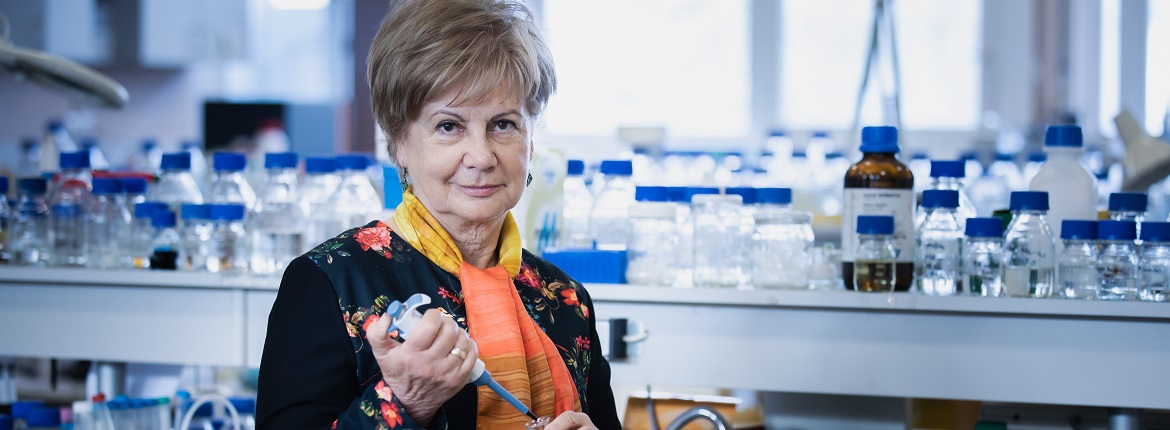
“Where are women in science?” Academician Éva Kondorosi asked in 2016, when there was no female elected member at the institution of the Hungarian Academy of Sciences. Working in the Biological Research Centre (BRC), Szeged she has also contributed to the development of Medical and Agricultural Sciences by her research on symbiosis and on infectious diseases. At the occasion of the International Women’s Day among others we asked the Science Diplomat why the Fabaceae plant family is her favourite.
I.Ú.: Your research work focuses on the Fabaceae plant family and their symbiosis with rhizobium bacteria. Giving the interview is on the 8th of March I need to ask, what is your favourite flower?
É.K.: Well 8th of March means the end of the winter. That is why I really like the spring flowers such as tulips, daffodils, and freesia. But 8th of March is a special day for me and not only because it is Women’s Day, but because it is the birthday of my daughter.
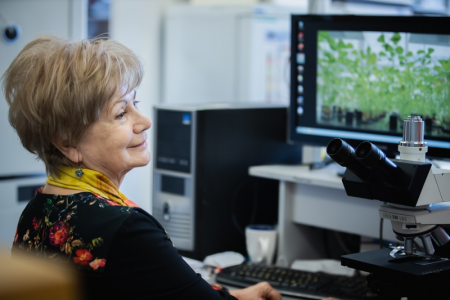
Women in the Pyramid
I.Ú.: “Where are women in science?” you asked in 2016, when at that time there were no new women permanent elected members admitted to the Hungarian Academy of Sciences. The literature of this topic has been growing since then and it is proven: the higher we are looking at the scientific pyramid the less women we see. What could be an explanation for this?
É.K.: It is a difficult question. Perhaps one of the reasons is that since there are more male colleagues in more senior positions than women; when they are thinking about who could be nominated to be members of different scientific committees, most cases they suggest their male colleagues. In those cases it seems as if they forget about their women colleagues. However, this seems to be changing: in the past 5 years many of my male colleagues pay attention to their excellent women researcher peers when it comes to awards, promotions or academic membership.
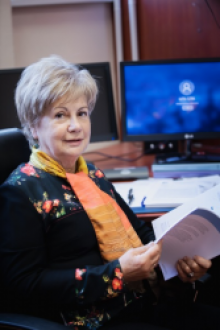 I.Ú: One can say that your research career is the exception? You are a full member of the Academy since 2010, you are a research professor at BRC, an elected member of the Scientific Council of the European Research Council (ERC), and you served as vice-president of the life sciences section until 2018. You participated in the work of the Scientific Advisory Board of the UN Secretary General – as one can read it in your professional biography on the website of the Academic Committee of the Hungarian Academy of Sciences in Szeged. You belong to the 7 researchers elected who are forming the main scientific advisory team of the European Commission. You were the research director of the CNRS Institute of Plant Sciences in France, which was co-founded with your husband. What is the reason you received all these recognitions and mandates?
I.Ú: One can say that your research career is the exception? You are a full member of the Academy since 2010, you are a research professor at BRC, an elected member of the Scientific Council of the European Research Council (ERC), and you served as vice-president of the life sciences section until 2018. You participated in the work of the Scientific Advisory Board of the UN Secretary General – as one can read it in your professional biography on the website of the Academic Committee of the Hungarian Academy of Sciences in Szeged. You belong to the 7 researchers elected who are forming the main scientific advisory team of the European Commission. You were the research director of the CNRS Institute of Plant Sciences in France, which was co-founded with your husband. What is the reason you received all these recognitions and mandates?
É.K.: Primarily my international professional success and recognition. However in general great emphasis is placed on the proportion of men and women in any scientific board, as well geographical origin. This is in the centre of attention of the European Commission and this also applies to the European Research Council, where, over the years, I compiled the list of experts for the life sciences panels, paying attention to the female-male ratio and also to the country of origin, especially that the new member states are represented as well.
I.Ú.: Why is it important to focus on these proportions? What difference a woman can make in science? Is there a difference between a female and a male researcher?
É.K.: I am convinced that as a researcher, a woman is completely different from a man. According to my experience nothing is impossible for a woman. If something needs to be solved they will find the solution, because they look for the opportunity to do so. Men are more cautious and less flexible. Just like in other fields of life. In my experience, us women are more optimistic in general. Life makes women to meet all challenges besides their families: if there is a problem with a child, problem at the household or at work I am sure they will find out how to fine tune all the three.
I.Ú.: Can we say that women’s approach to problems are more innovative?
É.K.: It is definitely practical and purposeful. I think there is enough talent and flexibility in women to always find the relevant solution.
Helping Role Models
I.Ú.: It is well-known among researchers that you worked closely with Ádám Kondorosi, professor of genetics. The close relationship is also expressed by the fact that you took your husband’s family name, when you married. Can you please describe your working relationship?
É.K.: Ours case was a special one. We obtained our PhD degree at the same institution, my supervisor said that we are equally talented. Ádám started working in the Biological Research Centre, Szeged, and I started here as well, after my graduation. I was amazed by all the talents working here. I only had one purpose in life at that time: to be the best wife of my husband and to assist him in everything. So I did not have any ambition to be a leader. I was happy to work in the field I love and at the same time assist my husband’s career.
I.Ú.: Nevertheless, your name is well-known since the 80’s. Today you are selected as a mentor for the Academy of Sciences Diplomacy program “Working Together for Health - Expertise, Trust and Security in the 21st Century with the Recommendation of 21 Women”. What happened between the two dates?
É.K.: I was really interested in the science itself. I would always opt for a research topic, which was not revealed by anyone else before in the world. These were always difficult topics, therefore researched by only a few. Later I had followers… I gained the scientific recognition based on my work and at the international level too. However, the fact that I achieved promotion at high levels happened when my husband got sick and I had to take over. Since I did not know how serious his illness was, hoping for his quick recovery, I would occasionally do his work in secret during the night as long as I could. Adam was highly respected and recognized by everyone in our field from a very young age, so he was elected to international organizations from the very beginning. When it was clear that his illness was terminal, I was elected to the different scientific bodies…But both of us were recognized, and two years after Ádám’s death we received the most important professional award in our field of science together.
I.Ú.: „Set a goal which has never been achieved by anyone. Because it is nice to go with mediocre scientists, but it is nicer to go further with the ones you can compete with but it is the best to arrive to a peak which has never been or even never ever will be reached” you cited János Apáczai Csere in your presentation in 2016. Who is your role model?
É.K.: Partly it was my husband who always inspired me and set challenges. Also my father Andor Tarnai, a literary historian who was my role model because of his great knowledge and infinite modesty. Or Ágnes Ullmann, a microbiologist, a famous researcher at the Pasteur Institute, from whom I learned a lot about how to stand up as a woman in the world of science, and who, as my “substitute-mother”, helped me a lot with her critiques and advice. Unfortunately, today, they only live in my memories ...
Closer to Europe
I.Ú.: Besides the Hungarian Academy of Sciences, your work is also acknowledged by many other international science communities. You are full member of the European Academy of Sciences, National Academy of Sciences of the United States, the French Royal Academy of Sciences and the German National Academy of Sciences. What is your opinion, what are the most essential cornerstones to have a successful career in science as a woman?
É.K.: In my opinion in countries of the Central European region conventional structure and thinking is still dominant. In Western-European countries women build their careers in a gradually different way. There women try to evolve a gradually increasing successful career path already from the university studies. In Hungary I do not feel people have the motivation to do the same, because to have a family and children is a bigger priority here. To develop a merge of the two systems, meaning how a woman can be able to master her profession and excel in her field of work, meanwhile taking care of the family would need more focus from the whole society and from the close family members and partner. By sharing the workload and encouraging the wife, partner and mother of the children, husbands or partners should facilitate women to carry on their professional work besides family duties.
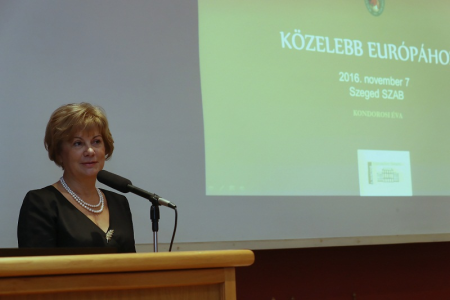
I.Ú.: At the Academic Committee of the Hungarian Academy of Sciences in Szeged „Celebration of the Hungarian Science” program in 2016 you presented a talk with the title „Closer to Europe”. During this presentation you emphasized that more attention should be payed to teaching science. Why?
É.K.: I believe that students have to receive high-level education. In my time, when I applied to the university, the biologist training was a novelty. In one year 16-18 students received admittance, therefore we received a more in-depth attention and knowledge from our professors, which cannot be provided for a much larger number student base. Now I see that there are many more students in one year, therefore the special student-teacher relationship we used to have is impossible to evolve. During my university years to excel and be outstanding in our field was the only option to build an exceptional career. Today I feel that students have less motivation.
I.Ú.: What is your relationship with the University of Szeged (USZ), which institution trains the new generation of scientists?
É.K.: Our professional relationship with the University of Szeged is regular involving multiple faculties and departments. Currently we are working on a paper submission which is based on a collaborative work with the USZ Department of Microbiology and the Department of Medical Chemistry. Many of our PhD students published in journals based on a collaboration with the USZ and gained their PhD degree.
I.Ú.: Science is international. The goal of the „Lendület” proposal of the Hungarian Academy of Sciences and the grant system of the National Research, Development and Innovation Office is to build an environment, where a scientist does not feel the difference whether they are working in Hungary or abroad. Where is Szeged located on the international map of science?
É.K.: I date the golden age of the Biological Research Centre, when work started here. Back in those days (from 1970) the research centre opened with a completely novel instruments, many young and talented scientists, who were selected during a 5-year process and chosen to be employed here. There was a possibility to invite high-rank international professors, who were willing to come and mentor young scientists. With their presence, and due to the high number of students from abroad arriving and taking part in international training courses we had a very multicultural atmosphere. This was very important for the institute to succeed. Currently the Research Centre has less international students and scientists, because our work here is not appealing enough compared to the big western research institutes. The Hungarian Academy of Sciences now has a new scholarship to promote the invitation of experienced professors from abroad. We also invited a guest recently, whose presence and mentoring helped the training of young scientists. I would prefer that these visits were more regular, through this science could be more international in Szeged again!
I.Ú.: In 2018 you received the prestigious Balzan prize, which is considered to be an indicator of a future Nobel Prize. Before this prize in 1985 you received the prize of the Hungarian Academy of Sciences, in 2007 the Hotchkiss Foundation’s prize and in 2012 the Széchenyi Prize. Also you received the IS-MPMI (International Society of Molecular Plant-Microbe Interactions) recognition from your more specialized field. What do you recommend for students and young scientists, who received prizes previously at the Academic Committee of the Hungarian Academy of Sciences in Szeged grant proposals?
É.K.: Do your job with passion! This always leads to success. All kinds of recognition promote ones scientific advancement, if considered as a supporting force. Dare to dream big and be brave!
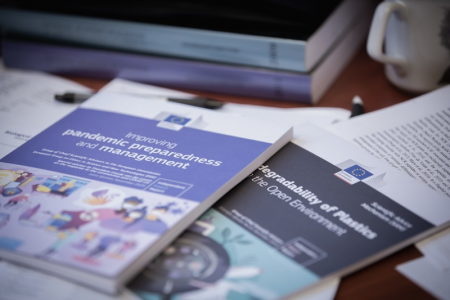
Miracles of the symbiosis
„Everyone knows, that the element nitrogen is essential for life, for the synthesis of proteins and nucleic acids. The air is full with nitrogen gas, but neither the plants, nor the animals are capable to utilize it in this form. Plants are able to build nitrate into their organic molecules, and we obtain nitrogen from the plants. The problem is, that in the soil there is too little amount of nitrogen, which is supplemented in the agriculture by using nitrogen based fertilizers, but on the long run this leads to environmental pollution and promotes climate change. There are several bacteria, which are capable to reduce nitrogen from the air into ammonia. The most efficient form of this phenomenon is present as a symbiosis between Leguminosae plant family (Fabaceae, „bean family”) and Rhizobia bacteria. We are investigating this aspect – Éva Kondorosi explained the essence of her research topic on her talk titled „The miracles of symbiosis” as a newly accepted member at the Hungarian Academy of Sciences. We are looking for answers to the following questions: How do these bacteria induce the formation of root nodules in the host plant? What happens with the bacteria in the cells of the plant? How do these form into nitrogen binding bacterioids and what kind of molecular communication facilitates this between the bacteria and the plant partner? This is extremely interesting! We found a novel gene family, which codes about 700 small proteins (peptides), but are only present in plant cells which carry the bacteria and promote their transformation. These peptides are responsible for many new biological phenomena, which are still to be discovered. Some of them are potential future antibiotics, which efficiently eliminate pathogenic bacteria and fungi. Currently we are investigating whether any of these new peptides could be used as potential anti-viral of anti-cancer molecules.”
SZTEinfo - Újszászi Ilona
Archive photo by: Béla Dusha
Photos by: István Sahin-Tóth

